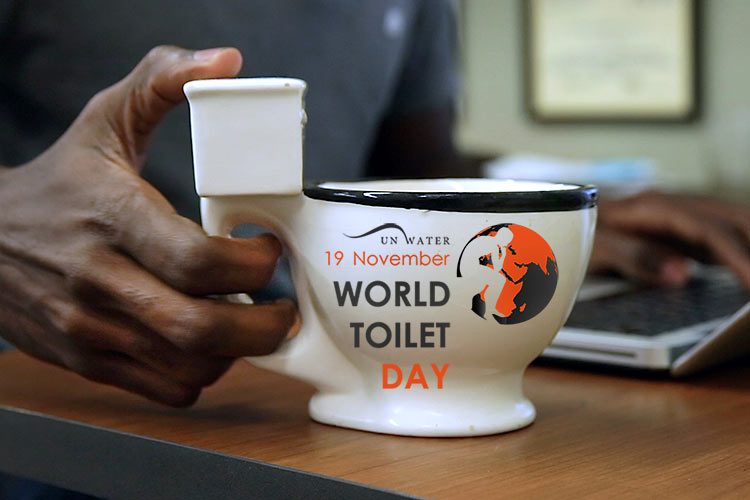Celebrating World Toilet Day, reinventing sanitation
U.N. World Toilet Day, Nov. 19, highlights global sanitation shortfalls (close to one in three lack adequate sanitation) and their toll on human health and the environment. Grad students William Tarpeh and Emily Woods are taking up this challenge with innovative work to repurpose human waste.

November 16, 2015
United Nations World Toilet Day is William Tarpeh’s main chance — a time to proselytize about all things sanitation. A doctoral student in environmental engineering at UC Berkeley, he tweets regularly about topics like toilets and international development. But on Thursday he plans to up the ante, with dozens of tweets on “sanitation, poop, urine and water.” (Text continues below video.)
Video produced by Roxanne Makasdjian and Stephen McNally. Graphics by Stephen McNally and Hulda Nelson. Nairobi footage courtesy of Sanergy.
That’s the day of the annual international observance dedicated to the toilet, meant to draw attention to the worldwide sanitation picture and its impact on health, safety and the environment. The facts may be startling to those who enjoy modern sanitation: An estimated 2.4 billion people worldwide (about one in three) lack access to a facility that at least separates human excrement from human contact. More than a billion relieve themselves on the ground or into open bodies of water. Nearly a thousand children a day die of diarrhea related to water, sanitation or hygiene.
Tarpeh wants to change that picture — and address other needs in the process. For now he’s focusing on urine, which “appeals to me in all senses of who I am,” he says.

William Tarpeh
In the lab, he’s using new technical processes to extract nitrogen from urine to create a nutrient-rich fertilizer. “From a technical perspective,” he says, “urine has a lot of interesting chemistry going on.”
Sanitation issues speak to Tarpeh’s humanitarian bent as well. While working in Ethiopia, he witnessed what the lack of a toilet could mean: Young women dropping out of school around puberty when their school lacked a public toilet; kids playing near troughs full of human waste.
“In our society, we don’t think about the toilet,” Tarpeh notes. “You do it, you flush it, ‘bye.” But access to a toilet “can literally change the course of someone’s life.”
(He cautions that even when toilets are made available, some people refuse to use them — instead continuing to practice open defecation. Linking these toilets to the production of much-needed inexpensive fertilizer may incentivize adoption, he says.)
Even in the U.S., “it’s worth exploring new options that might make more sense for the hundred-year view,” says Tarpeh. Our system for dealing with human waste “is a hundred years old; the last time the toilet had a major overhaul was when it first came out in 1850. It’s time to reinvent it.”
Tarpeh calls sanitation the “ugly stepsister” of water advocacy, which is aspirational and well-funded. “We see lots of ads of children with water splashing over their face,” he says. Water may be a sexier sight than sanitation, “but providing clean water won’t go very far if people are still defecating on the ground. The water will just get polluted again.”
Emily Woods is Tarpeh’s counterpart on the feces side of sanitation. A grad student in Berkeley’s Energy and Resources Group, she’s also co-founder of Sanivation, a young business venture that has begun converting human feces into cooking charcoal in a poor community in Kenya. (Text continues below video.)
Developed by trial and error, the company’s business model is this: Twice a week, a worker delivers an empty urine-separating toilet to each subscriber’s home, and the full toilet is brought to a central waste treatment site. There, the feces are solar-heated using a large parabolic mirror, killing off all bacteria and pathogens in about a day.
Sanivation workers then combine the heat-treated feces, which make an excellent binder, with carbonized agricultural waste to manufacture a sustainable, hot-burning charcoal briquette for use in residences and small businesses. In eastern Africa, charcoal is widely used for cooking, she notes, but charcoal prices are skyrocketing.

Emily Woods
“There’s a growing need for new kinds of fuel,” says Woods. Her company addresses that need while also improving sanitation.
“I’m fascinated by using engineering, technology and science to develop simple, beautiful solutions that work in business models,” she says.
Woods, who has a B.S. in mechanical engineering, is redesigning her waste treatment model to make it work at scale; additionally, she’s taking intermediate Swahili classes and beefing up her business skills.
“As hard as it is to be away from Kenya,” she says, “Berkeley is a great place to be.”
A number of campus faculty and students are working on water, sanitation and hygiene, she’s found. And a number of researchers at Berkeley have been developing cleaner cook stoves. “I had no idea! ‘Wait a second — you helped design that? I use that every day in Kenya!'”
Related information:
- 2015 UNICEF/WHO report “25 Years’ Progress on Sanitation and Drinking Water” (PDF)
- Professor Isha Ray’s research on the fight for gender equity in sanitation (Blum Center article)